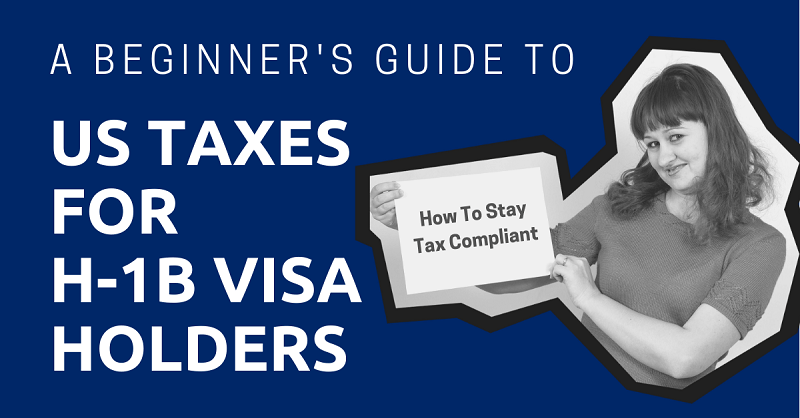
This article will take approximately 29 minutes to read. Don't have the time right now? No worries. Email the ad-free version of the article to yourself and read it later!
Did you know that as a tax resident working in the U.S. you have the same tax obligations as U.S. citizens?
That’s right. You must pay federal income taxes every year. And depending on where you live, you may also have to pay state and local taxes as well. Moreover, you’re taxed not only on your U.S. income, but on all the money you make anywhere in the world.
With that said, this guide will simplify the tricky U.S. tax system, show you when and how to file, how to reduce your taxes, and more importantly how to get help.
Because let’s face it, even most naturalized U.S. citizens hire an accountant or use a service like TurboTax to help lower their taxes or get higher returns.
Disclaimer: This article may include links to products or services offered by ExpatDen's partners, which give us commissions when you click on them. Although this may influence how they appear in the text, we only recommend solutions that we would use in your situation. Read more in our Advertising Disclosure.
Contents
- What is an H-1B Visa?
- What are the Tax Obligations for H-1B Visa Holders?
- Filing Your Taxes on an H-1B Visa
- Filing Tax Returns
- Deductions
- Tax Credits
- Foreign Earned Income
- Foreign Bank and Financial Accounts
- How Is Income from Dividends and Investments Taxed?
- What Happens if You Live in Multiple States?
- How To Deal With Taxes When You Have Multiple Jobs
- How To Deal With Taxes When You Have Multiple Jobs
- How To Get the Necessary Tax Return Forms
- Now, on to You
What is an H-1B Visa?
An H-1B visa is a non-immigrant, employment-based, visa issued by the U.S. Citizenship and Immigration Services (USCIS) that allows U.S. employers to temporarily employ foreign nationals to work in specialty occupations.
H-1B visas are issued to skilled workers who have specialized knowledge or work skills in areas such as:
- Medicine
- Architecture
- Accounting
- I.T.
- Science
- Mathematics
- Finance
For this visa to be approved, the employer must have previously offered the position in the U.S. It’s the employer who petitions the USCIS for the H-1B visa, pays all visa fees, and submits all the necessary paperwork on behalf of the applicant.
Once the petition has been approved, the employer will forward all the papers to the foreign national to allow him or her to get the H-1B visa put in their passport.
This visa lets you live and work in the United States for three years, sponsored by an employer. The initial three-year period can be extended for a further three years.
What are the Tax Obligations for H-1B Visa Holders?
Paying income tax is one of life’s inevitable events. We probably all have to pay it at some time, and having an H-1B visa means you’ll be the same as everybody else in the U.S.
That is, you will pay income tax on your earnings.
The amount of tax you can expect to pay on your income depends on a number of factors.
Depending on the income level, an H-1B visa holder will pay between 20 percent and 37 percent of earned income in federal, state, and local taxes. These taxes are made up of: federal income tax, Federal Social Security and Medicare Taxes (FICA), and depending on which state you live in, possibly state and local income tax.
Your employer will deduct taxes from your wages.
Federal Income Taxes
Your annual taxable income will determine how much federal income tax you will eventually pay.
The tax brackets for the 2020 tax year range from 10 percent to 37 percent, based on the total income amount. Each tax rate has a range of income levels, which can be somewhat difficult to understand.
There are four main options for filing a tax return:
- single
- married filing jointly
- married filing separately
- head of household
If we take filing single as an example, the following are the different tax rates based on your taxable income:
- $0 to $9,875.00 – 10 percent
- $9,876 to $40,125 – 12 percent
- $40,126 to $85,525 – 22 percent
- $85,526 to $163,300 – 24 percent
- $163,301 to $207,350 – 32 percent
- $207,351 to $518,400 – 35 percent
- $518,401 or more – 37 percent
The majority of H-1B holders will pay between 20 percent and 35 percent of their adjusted gross taxable income in Federal taxes. The adjusted gross taxable income is the total income less any allowed deductions.
For the 2020 tax year, the standard deductions for all filers are:
- Single or Married filing separately—$12,400.
- Married filing jointly or Qualifying widow(er)—$24,800.
- Head of household—$18,650.
Using the above example, if you’re single, have an annual gross income from all worldwide sources of $50,000, then your adjusted taxable income would be $50,000 – $12,400 = $37,600.
That total would put you in the 12 percent tax rate, which means you’d have to pay about $4,500 in taxes. Since employers deduct income tax from any earned income, the majority of taxpayers find they have had too much deducted and are due a refund from the IRS.
Keep in mind that these examples apply to an H-1B visa holder who is taxed as a resident alien.
If you’re classed as a non-resident alien, then only the income that is generated from within the U.S. will be taxed, but no deductions can be claimed.
Social Security Taxes
Everyone who works in the U.S. with a H-1B visa has to pay social security tax. It is officially known as Federal Social Security and Medicare Taxes (FICA) and composed of two type of taxes:
- Social security
- Medicare
The social security rate in 2021 is 12.4 percent and is split between you and your employer. This means that you have to pay 6.2 percent of your income to the U.S. social security system, with a maximum income of $142,800.
With this, the maximum amount you can pay to a social security is $8,853.60 (6.2 percent of $142,800) per year.
Please note that the maximum income increases by 3 percent every year.
In addition to social security, you also have to pay another 1.45 percent of your income for Medicare.
State Income Taxes
Out of the 50 States, there are 41 that have a state income tax that is also deducted from any earnings.
A majority of states use a progressive tax rate. The amount of this additional income tax depends on which state you work in, but is normally up to 10 percent of your income.
You can see a full list of state income tax rates here.
Again, this will be deducted by your employer.
Local or City Taxes
There are some cities and municipalities that have a local income tax, which can vary from 1 percent to 4 percent of income.
If the city you live in has a local income tax, the address on all tax forms must be accurate. If not, you could pay the wrong local tax.
For example, in the State of Michigan, 20 cities levy 1 percent income tax on residents and 0.5 percent income tax on non-residents.
However, four cities in Michigan have different local income tax rates:
- Grand Rapids – Residents 2.4 percent, non-residents 1.2 percent
- Detroit – Residents 1.5 percent, non-residents 0.75 percent
- Highland Park – Residents 2.0 percent, non-residents 1.0 percent
- Saginaw – Residents 1.5 percent, non-residents 0.75 percent
Filing Your Taxes on an H-1B Visa
The tax year ends 31 December and returns must be filed by 15 April of the following year. There are numerous tax forms in the U.S. tax system, so filing the correct ones is important.
An H-1B visa holder will be classed, for tax purposes, as either a resident alien or a non-resident alien by the annual substantial presence test.

Resident aliens are treated the same as U.S. citizens and are taxed on worldwide income.
On the other hand, non-resident aliens are only taxed on the income they receive from U.S. sources.
After determining your filing status, you need to get the right tax form, either form 1040 or form 1040NR, in order to file your taxes with the IRS.
Which Form Should You Use?
U.S. citizens, permanent residents, and resident aliens use Form 1040 to file their taxes. All income must be declared – not just income from U.S. sources, but all income, no matter where it originates.
Non-resident aliens must use Form 1040NR (Income Tax Return for a U.S. Non-resident Alien) to file their taxes.
Unlike resident aliens, only U.S. sourced income that was received at any time throughout the year needs to be recorded and taxed.
What Paperwork is Needed to File a Tax Return?
First of all, download the correct form from the IRS website.
- Form 1040 (PDF)
- Form 1040NR (PDF)
You’ll need your Social Security numbers and dates of birth for yourself, your spouse, and any dependents (if applicable).
Without this information, the IRS won’t know who you are or what earnings should be taxed on your tax return.
You’ll next need to gather together the following information:
- W-2 form from your employer
- Any 1099 form received (-DIV, -INT, -NEC, etc.)
- Any mortgage interest paid – form 1098
- Real estate taxes paid
- Any local and state taxes paid
- Any personal property taxes paid
When you have collected all the paperwork you receive from your employer, banks, mortgage companies, property tax collectors, or any other party that taxes or payments have been made to, you’re ready to start filing your taxes.
Completing Tax Forms
The form you download is a fillable PDF document, and by filling in each box as requested, completing the tax return shouldn’t present too much difficulty.
Completing form 1040 – U.S. Individual Income Tax Return – is quite straightforward, filling in each applicable box.
Depending on the circumstances, filers can choose to either take the standard deduction or itemize their deductions, whichever will give the larger amount of deductions.
Itemizing deductions can be quite involved, as some rules and formulae must be adhered to in order to take advantage of this method.
One significant difference between the 1040NR and the 1040 is that non-resident aliens cannot claim any standard deductions, with the exception of certain residents of India.
Non-residents aliens, however, can claim itemized deductions to reduce their taxable income.
If we look at completing the 1040NR – U.S. Nonresident Alien Tax Return – the choices of filing status are less than that on the 1040 tax return.
A non-resident alien can only choose to file as: single; married filing separately; or as a qualifying widow(er).
Even if you’re married, to all intents and purposes, you file as a single person and your spouse has to file a separate tax return.
Filing Tax Returns
If you want to file your taxes yourself, you can do it by mail or electronically.
If you do it by mail, you can mail the completed forms to the IRS office in your state. If you owe money on your taxes and don’t enclose a payment in your mail, you may need to send it to a Department of Treasury office instead.
You can find address on the IRS website.
Filing taxes by mail is becoming unpopular since it’s more complicated than filing it electronically and takes longer to get a tax return, especially during the COVID-19 pandemic.
Electronically
You can file your tax returns electronically through tax software websites that have partnered with the IRS.
Free File Service
The IRS provides a free file service that allows you to complete your tax return and file it online through tax software websites for free.
Based on your income, there are two options:
1. Free File Program is for people with an adjusted gross income (AGI) less than $72,000. With the Free File Program, the tax filing application will guide you through the process and does all of the calculations.
2. Free File Fillable Forms is for people with an adjusted gross income (AGI) greater than $72,000. With this option, you need to know how to complete the form since the tax filing application only comes with basic calculation.

You can select a tax preparation company website of your choice that participates in the Free File program from the IRS website.
You should note that the Free File Program is usually only available for filing federal tax returns.
If you go with this option, you may need to file state tax separately by mail since a lot of tax preparation companies don’t provide a standalone software on filing state tax.
Paid Tax Software
You can use paid tax software to file federal taxes, state taxes, and local taxes at once.
This tax software takes you through a series of questions and answers to make the completion of the tax return as simple as possible.
At every stage, the product checks your answers against industry standards and will make suggestions to correct the answer if necessary.
TurboTax is one of the most popular software programs for preparing and filing your tax returns. You can choose to complete your return either online or download the software to your desktop computer.
Usually, paid tax software will have four packages:
- Basic – for those who only have income from work and don’t have any itemized deductions.
- Deluxe – for those who want to maximize their deductions, including mortgage and property taxes.
- Premier – for those who have multpile stream of income, including investment and rental properties.
- Self-employed/Home and Business – designed for anyone who receives a 1099-NEC.
If you don’t want to file yourself, you can choose to pay more and have a TurboTax expert file it for you.
When all the tax return information has been entered, TurboTax will review the return for any errors and direct you to make corrections.
If everything is correct, you can file your federal tax return online or opt to print it and mail it to the IRS.
TurboTax’s other products are priced differently according to the complexity of the return, and the price is for federal returns only. State tax returns are an add-on.
NOTE: TurboTax doesn’t cater to non-resident 1040-NR tax returns. It can only produce returns for U.S. citizens and resident aliens.
If you’re a non-resident, you can use Sprintax instead.
Tax Filing Company
Another option is to use a tax filing company who will efile your tax return.
These companies charge for filing your taxes. It’s a good option if you want to make sure that you file your taxes correctly. They can also help you file late tax payments.
You can check out 1040abroad. They help U.S. citizens and immigrants file taxes in the U.S.
Deductions
H-1B visa holders working in the U.S. may find it difficult to know what deductions and credits they can claim on their tax returns.
Knowing what can be deducted could possibly reduce the amount of income tax due, and perhaps increase tax refund amounts.
You can only choose either standard or itemized deductions. You should also carefully calculate and choose a deduction option that gives you the greater amount of deduction.
Standard Deductions
- Single: standard deduction of $12,400
- Married filing jointly: standard deduction of $24,800
- Married filing separately: standard deduction of $12,400
- Head of household: standard deduction of $18,650
- Qualifying widower: standard deduction of $24,800
Standard deductions, as shown above, are for the 2020 tax year and apply only to H-1B visa holders who are treated as resident aliens for tax purposes.
Non-resident aliens cannot claim any standard deductions and must choose to file as single, married filing separately, or as a qualifying widow(er).
Itemized Deductions
You can select itemized deductions instead of the standard deduction to reduce the amount of your taxable income.
In using this method, an additional form must accompany your tax return.
The form you need to complete is IRS form Schedule A, which has several main categories of itemized deductions that can be claimed.
Please note that some states don’t allow itemized deductions, including Michigan and Massachusetts.
Medical and Dental Expenses
At first glance, this seems to be an ideal way to reduce your taxes, but it is in fact the most complicated and costly to qualify for.
If you have paid for medical-related expenses that aren’t covered by health insurance, then you’re allowed to deduct those amounts if they exceed 7.5 percent of your adjusted gross income (AGI).

The important word in this deduction is “exceed.” If your AGI is $30,000, then to qualify, you must have paid out more than $2,250 in medical expenses.
For example, your medical bills total $4,000, you can only deduct $1,750 and not the whole amount.
Premiums for Long-Term Care
These are tax-deductible but only the amounts that exceed 10 percent of your AGI.
Interest Expenses
You can deduct interest paid on mortgages and some home-equity loans.
Mortgage lenders will issue a 1098 form showing how much deductible interest you have paid during the year.
Taxes
You can deduct real estate taxes plus any state and local taxes that were assessed during the prior tax year, but with a combined limit of $10,000.
(H-1B visa holders cannot claim for any real estate taxes paid on property they own outside the U.S.)
Donations to Charity
Donations made to charities can be deducted, but have limitations.
Cash donations cannot exceed 60 percent of your AGI, and other donations may have a limit of 50 percent, 30 percent, or 20 percent of your AGI, depending on what you donate and the charity receiving the donation.
Casualty and Theft Losses
Any casualty and/or theft losses incurred after a federal disaster can be claimed, but only amounts greater than 10 percent of your AGI.
Other Itemized Deductions
All other deductions must be listed on the Schedule A instructions. If your deduction is not listed, then you cannot claim it.
Health Savings Account
By having money in a Health Savings Account (HSA) you can reduce your income tax, but the plan must be a high-deductible health plan.
If your employer contributes towards the plan, these contributions aren’t deductible.
401K Contributions
If your employer offers a 401K, the contributions you make to a qualified plan are pre-tax, which means they are deducted from your taxable income, reducing the amount of income tax you will pay.
Tax Credits
In addition to deductions, you can significantly decrease the amount of tax you pay to the U.S. — or increase the amount you get back — through tax credits.
Tax credits are different than deductions since they directly decrease the amount of total tax you pay dollar by dollar.
For example, if you have a tax credit of $2,000, it means you pay $2,000 less tax. Tax credits are only available to resident aliens.
Let’s take a look at the two popular tax credits for an H-1B visa holder.
Child Tax Credit
In general, the child tax credit gives you a maximum of $3,600 tax credit per child if he or she is a dependent, has a resident alien status in the U.S., and lives with you at least 183 days a year.
The credit is available for those who have a legitimate child or an adopted child who is younger than 17 years old.
The amount of tax credit you can get mainly depends on your gross income and your child’s age.
Child tax credit is complicated. It can be nonrefundable, partially refundable, or fully refundable based on you, your dependent, and the U.S. regulations at that time.
Child tax credit regulations are also subject to change every year.
The IRS has interactive tax assistance to help you find out if you’re eligible for a child tax credit and how much can you get.
Education Tax Credit
You can get an up to $2,000 non-refundable for education tax credit if your gross income is less than $80,000 for single filers and $160,000 for married filers.
An education tax credit is available to anyone who is currently taking an undergraduate, graduate, or professional degree program.
An education tax credit is calculated from the 20 percent of the first $10,000 expenses on your education, including tuition fee, books, and learning materials.
An education tax credit is available to you, your spouse, and your dependent.
You can find out more on the IRS’s website.
Foreign Earned Income
Any H-1B visa holder who is treated as a resident alien for tax purposes must report any and all earned income regardless of where it originates and is required to report any foreign accounts and assets.
If a resident alien also pays foreign-sourced income tax on income, they may be eligible to claim foreign tax credits.
A financial advisor with knowledge of international income taxes should be consulted to ensure all income is declared and any credits are taken.
If the H-1B visa holder is treated as a non-resident alien, then they are not liable for income tax on any foreign earned income.
If you’re classified as a non-resident alien, then you’ll be taxed only on income generated in the U.S., while resident aliens are treated the same as U.S. citizens and taxed on their worldwide income.
As a non-resident alien working on an H-1B visa, your income received from a U.S. employer is taxed at the same tax rates as U.S. citizens. You must file a tax return using Form 1040NR, but unlike U.S. citizens, you cannot claim the same deductions.
An H-1B visa holder, classed as a resident alien, has to file a tax return using Form 1040 and can claim deductions, but all income, regardless of its origin, must be recorded and will be taxed.
According to the IRS: “A Substantial Presence Test (PST) is used to determine if an individual, who is not a U.S. citizen or a legal permanent resident, should be treated as a resident for tax purposes or a non-resident for tax purposes”.
In simple terms, the PST states you’re a resident for tax purposes if you were physically present in the U.S. for at least 31 days in the current year, or 183 days during the past three years, including the current year.
Foreign Bank and Financial Accounts
A resident alien in the U.S., including H-1B visa holders, needs to file a Foreign Bank and Financial Accounts Report (FBAR) before 15 April or 15 October with an automatic extension if they have a foreign financial account that has an aggregate value over $10,000.
You can compare exchange rates on the Department of Treasuries’s website.
You don’t have to file an FBAR if the foreign bank belongs to government entities or is owned by an international financial institution.
If you don’t file, however, you might be faced with civil or criminal penalties enforced by the Financial Crimes Enforcement Network.
How Is Income from Dividends and Investments Taxed?
A non-resident alien who receives payments other than earned income, such as rent, dividends, royalties, interest, or any other non-employee remuneration, will pay a 30 percent federal income tax on this income.
However, they may be able to lower the tax rate if the country making those payments has an income tax treaty with the U.S.
These types of payments must be reported to the IRS on form 1042 or 1042-S.

If the H-1B alien is a resident alien, any payments not wage-related — like rent, dividends, royalties, interest, or any other non-employee remuneration — are not subject to withholding tax.
You still have to file taxes the same way and at the same rate as U.S. citizens, which is at 0 percent, 15 percent, or 20 percent depending on your income.
As a H-1B alien, you need to inform the entity issuing the payment of your U.S. tax ID number (TIN). Otherwise, backup withholding tax will be applied to these payments at a rate of 28 percent.
You must report these payments to the IRS on Form 1099-MISC, Miscellaneous Income, and on Form 945 if backup withholding applies.
What Happens if You Live in Multiple States?
Things quickly get complicated if you live or work in multiple states.
Chances are you may have to pay and file taxes in all of the states you live in during that year. The type of tax you have to pay depends on your tax status, which is either part-year resident or nonresident.
In general, part-year residents pay all types of income taxes during the time they live in that state, while nonresidents pay only income taxes generated from wages.
Each state website has a specific page dedicated to this situation for part-year residents and nonresidents. It’s best to check your state(s) requirements individually.
If you work and live in multiple states, you might want to get advice from a TurboTax tax advisor.
How To Deal With Taxes When You Have Multiple Jobs
Having more than one job while in the U.S. and on an H-1B visa is not as simple as you think.
To be in compliance with the U.S. Immigration Reform & Control Act, all new employees have to show that they are legally authorized to work in the U.S.
H-1B visa holders have been approved to work for the employer who petitioned for the visa on their behalf. All the paperwork relating to the visa will show both the worker’s name and the employer’s name.
So although your employer was the one who petitioned for the visa, received approval, and subsequently employed you, proof of identity and authorization to work may be copied and kept on file.
Your passport will contain the H-1B visa, and with the H-1B approval notice (Form I-797) you can prove that you’re legally allowed to work in the U.S.
To have multiple jobs means providing the same proof, but your paperwork shows you can only work for your sponsor-employer, making it difficult to legally have more than one job.
However, a second employer can file for a “Concurrent” H-1B visa, but although it’s possible to have more than one job on an H-1B visa, the USCIS may not approve a concurrent petition if it appears that working more than one job is not feasible.
If you’re able to have multiple jobs, then each employer will issue you with form W2 at the end of the year, showing your gross pay, taxes withheld, etc.
When you file your tax returns, you record each W2 received as your total income. However, having more than one job may result in paying higher income taxes.
How To Deal With Taxes When You Have Multiple Jobs
Getting in touch with the IRS can be a nightmare: long wait times, confusing phone menus and sometimes you just can’t seem to get hold of an actual person at all.
Wouldn’t it be nice to have the IRS call you instead?
There’s an amazing service that delivers an experience as close to it as it gets: Claimyr calls the IRS for you, navigates the phone menu, waits in line and calls you once they have a real person on the phone. It’s like having your own secretary who makes sure you’re never on hold.
This can be super useful – especially if you’re trying to get hold of them before the upcoming tax deadline on April 18th. And using this link, you can actually get $5 off your first call.
We tried it and it’s an absolute game changer.
How To Get the Necessary Tax Return Forms
All the forms you need to file your annual tax return can be found on the IRS’s website.
Below we have listed the most common forms needed with links to download them.
The forms needed for H-1B Visa Resident Aliens are:
- Form 1040 – U.S. Individual Income Tax Return
- Form 1040 Schedule 1 – Additional Income and Adjustments to Income
- Form 1040 Schedule 2 – Additional Taxes
- Form 1040 Schedule 3 – Additional Credits and Payments
- Form 1040 Schedule A – Itemized Deductions
- Form 1040 Schedule D – Capital Gains and Losses
- Form 1040 Schedule E – Supplemental Income and Loss
The forms needed for H-1B Visa Non-Resident Aliens are:
- Form 1040NR – U.S. Nonresident Alien Income Tax Return
- Form 1040NR Schedule A – Itemized Deductions
- Form 1040NR Schedule NEC -Tax on Income Not Effectively Connected With a U.S. Trade or Business
- Form 1040NR Schedule OI – Other Information
Instructions on how to complete each form are also available on the IRS’s website.
Alternatively, you can use a tax software like TurboTax to file your U.S. tax return.
The U.S. tax system is complicated. Errors or delays in filing can be costly. Fines can be levied for late filing and interest may be charged on the total tax due.
Now, on to You
To maintain compliance with your H-1B visa status, there are certain responsibilities that you must adhere to, one of which is to make sure you file your taxes on time.
Be truthful about income and deductions, as any false statements could result in revocation of the visa. And do not be tempted to get supplemental employment unless you have a second H-1B visa naming that employer.
Always make sure that you’re in current status. If, for any reason, you lose your job with the sponsor employer, you’re considered to be out of status and will have to leave the U.S.







